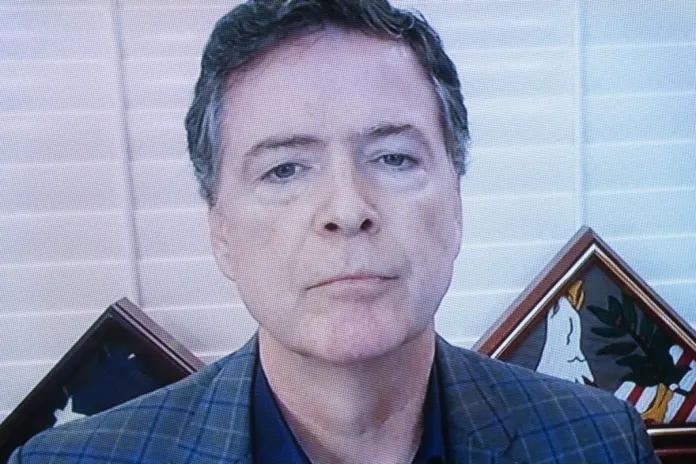ALEXANDRIA, Virginia — Former FBI Director James Comey pleaded not guilty Wednesday morning to charges of making false statements and obstructing a 2020 congressional proceeding, as prosecutors signaled the case would introduce classified information in the discovery phase of legal proceedings.
The prosecution, led by U.S. Attorney Lindsey Halligan, argued this was a complicated case and pushed for more time before bringing it to trial. U.S. District Judge Michael Nachmanoff, an appointee of former President Joe Biden, raised skepticism about how complicated the two-charge indictment is, but he eventually agreed that a preliminary date for when the trial could begin is Jan. 5.

The government requested that a trial take place outside the “speedy trial window” in part because there is a large amount of discovery in the case, including “a lot” of classified materials, which were not previously discussed before the arraignment.
Comey’s attorneys, former Illinois prosecutor Patrick Fitzgerald and national security attorney Jessica Carmichael, informed the court that they do not have security clearances to view any classified materials, prompting the judge to tell the prosecution that they would either need to obtain clearances or that the government would need to consider declassifying the records.
Nachmanoff also told the prosecution team that the case would move forward, “or we will go through the fastest CIPA process you have ever seen in your lives,” referring to the Classified Information Procedures Act process that typically involves lawyers presenting materials to defendants in private settings away from public view.
Halligan, a former real estate lawyer and personal attorney to President Donald Trump, was only recently appointed to her position after Trump fired her predecessor, Erik Siebert, after sources revealed to multiple outlets that he was pushing back against charging New York Attorney General Letitia James for alleged mortgage fraud violations. Comey’s counsels are expected to challenge the legality of Halligan’s appointment to her position.
The newly appointed U.S. attorney did not speak during the nearly one-hour arraignment hearing, instead delegating the process to two prosecutors, Nathaniel Lemons and Gabriel J. Diaz, who were pulled from the U.S. Attorney’s Office for the Eastern District of North Carolina to assist in the case.
Comey arrived early at his seat inside the courtroom on the sixth floor of the courthouse and was supported by members of his family, including his daughter, Maurene Comey, who was fired from her post as a top prosecutor in the Southern District of New York earlier this year.
When asked by the judge if the former director understood the charges against him, he responded, “I do, your honor. Thank you very much.”
Comey welcomed a trial in his statement following the Sept. 25 indictment, though his attorney Fitzgerald signaled they may attempt to avoid one altogether. He was released on his own recognizance and departed the federal courthouse through a secured exit, while his family exited through the main courthouse entrance.
The grand jury issued charges against Comey last month relating to alleged false statements and obstruction that occurred five years ago on Sept. 30, 2020, when the former director allegedly deceived the Senate Judiciary Committee about whether he authorized another person “to serve as an anonymous source in news reports regarding an FBI investigation” into former Secretary of State and presidential candidate Hillary Clinton.
Sen. Ted Cruz (R-TX) questioned Comey on whether he had ever authorized someone within the FBI to be an anonymous source to the media about the Trump-Russia investigation or the investigation into Clinton. Comey said he stood by his previous testimony from 2017 that he did not authorize a leak.
The indictment does not name the individual whom prosecutors say Comey authorized to leak information, nor does it specify which articles were involved. However, a 2018 report by the Justice Department’s inspector general found that then–FBI Deputy Director Andrew McCabe had approved sharing details of the Clinton investigation with a Wall Street Journal reporter and later showed a “lack of candor” when Comey and other officials questioned him about the leak.
In a CNN interview last month, McCabe said he found it “unbelievable” that federal investigators had not contacted him regarding Comey’s testimony. “All I can say is what I personally observed — I never saw Jim Comey authorize anyone to leak information,” he said.
During the 2017 congressional hearing, Comey admitted he had asked a Columbia Law School friend to relay information to a New York Times reporter about his conversations with then-President Trump early in his tenure. That friend — a former special government employee, professor, and advice liaison to Comey, Daniel Richman — later confirmed he was the intermediary but said the material he conveyed at Comey’s request was not classified.
The introduction of classified documents to the narrow indictment will likely function to bolster the prosecution’s belief that Comey’s testimony to the Judiciary Committee was not forthright. But the judge warned that the introduction of these records should not allow the case to go “off track.”
COMEY MAKES HISTORY AS FIRST FORMER FBI DIRECTOR TO FACE ARRAIGNMENT
Nachmanoff, 57, oversaw the previous cases of Lev Parnas and Igor Fruman, associates of Trump ally Rudy Giuliani, and released them on $1 million bonds in 2019. In a more recent case, he declined to block the CIA from firing Terry Adirim, a Pentagon physician who was scrutinized by Trump allies over the COVID-19 vaccine mandate.
Both defense attorneys and prosecutors agreed that the eventual trial, set for the start of the new year, would only last approximately two days.
